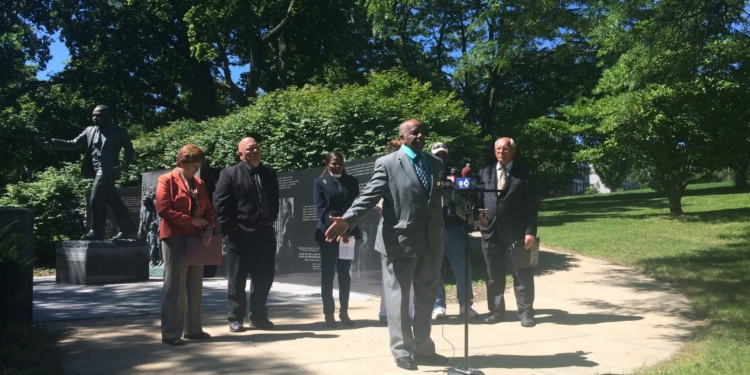In a presidential election year, local Congressman laments federal inaction on Voting Rights Act
On June 25, 2013, by a vote of 5-4, the U.S. Supreme Court ruled that Section 4(b) of the federal Voting Rights Act of 1965—which contained a formula by which it was determined whether a state would need to seek federal approval before being allowed to change voting laws—was unconstitutional.
 On Tuesday, Aug. 23, Congressman Paul Tonko held a press conference in front of the Martin Luther King Jr. Memorial in Albany’s Lincoln Park, calling for the swift passage of legislation to address continued racial injustice and ensure that the voting rights of all Americans are protected in time for the November elections. He was joined by Mayor Kathy Sheehan and other local minority leaders urging Congress to take action.
On Tuesday, Aug. 23, Congressman Paul Tonko held a press conference in front of the Martin Luther King Jr. Memorial in Albany’s Lincoln Park, calling for the swift passage of legislation to address continued racial injustice and ensure that the voting rights of all Americans are protected in time for the November elections. He was joined by Mayor Kathy Sheehan and other local minority leaders urging Congress to take action.
The formula set forth in Section 4(b) was used to determine whether a given state had shown clear enough discriminatory practices against minorities, such as those practiced in the days of Jim Crow, to justify the additional oversight of its voting practices by the US government. By ruling that it was unconstitutional because it was based on data that was more than 40 years old, the Supreme Court effectively also invalidated Section 5 of the Voting Rights Act, which required certain states, determined by that formula, to obtain federal pre-clearance before implementing changes to voting laws or practices. While the court did not strike down Section 5, there is no jurisdiction that is subject to it until a new formula is enacted.
Since the 2013 decision, a number of states that are now no longer required to obtain pre-clearance under Section 5 have enacted restrictive voting laws and removed others meant to increase ballot access, prompting federal legislators to call repeatedly for a new formula. The passage of voter ID laws and unregulated redistricting practices, as well as the removal of provisions such as same-day voter registration, online voting and early voting in states such as Arizona, North Carolina and Texas have had the measurable effect of disproportionately disenfranchising minority voters.
“While we don’t have in this state any of those egregious measures that disenfranchise voters, it is important to know that about 22 states have moved forward and made it more difficult for some of their population to access the ballot box,” said Tonko. “When there’s a threat to democracy anywhere, there’s a threat to democracy everywhere. . . The people of these given states can not be protected until Section 5 can be followed through.”
“We should stay and finish business,” said Tonko of himself and his fellow legislators. “Until all that work is done, we should not be on what is a historic 53-day break. I think it’s deplorable that we don’t take care of this measure in a presidential election year.”
 “Why are we here today,” asked Rev. Valarie Faust, senior pastor at Living Word Tabernacle in Albany. “We’re here because of racism.”
“Why are we here today,” asked Rev. Valarie Faust, senior pastor at Living Word Tabernacle in Albany. “We’re here because of racism.”
The struggle against racism in the U.S., she noted, has been going on for 150 years. “Enough is enough,” she said. “So what are we going to do? Number one: Don’t forget, or make light of, or deny the past struggles and the real root of the problem—racism and hatred and ongoing efforts to dehumanize a people.
“And vote,” said Faust. “But know who you are voting for. If people have hate in their heart, it’s going to come out in their vote.”
In June of 2013, Justice Ruth Bader Ginsberg summarized her dissent from the bench, an unusual move that signaled deep disagreement. She cited the words of Dr. King and lamented that the nation’s commitment to justice had been “disserved.” “Voting discrimination still exists,” she said. “No one doubts that.”



